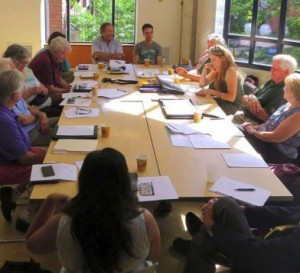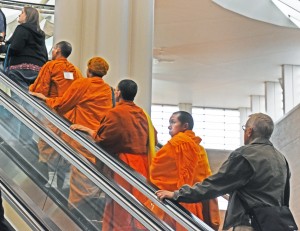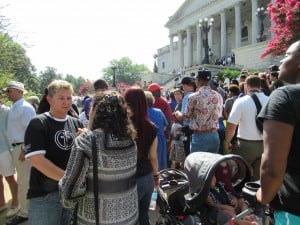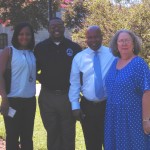 I recently attended an international interfaith conference, the annual conference of the North American Interfaith Network (NAIN). A question put to the audience by the facilitator during one of the breakout sessions was, “What do you see or want to see as the future for interfaith?” Those of us present mentioned several desires for that we would like to experience, most notable was a colleague’s wish to have a cup of coffee during that hall-break with a co-worker who is of a different faith.
I recently attended an international interfaith conference, the annual conference of the North American Interfaith Network (NAIN). A question put to the audience by the facilitator during one of the breakout sessions was, “What do you see or want to see as the future for interfaith?” Those of us present mentioned several desires for that we would like to experience, most notable was a colleague’s wish to have a cup of coffee during that hall-break with a co-worker who is of a different faith.
This reminded me of my time working for Hospice At Charlotte, where I had the first of many cultural exchanges, particularly my first interaction with a female co-worker who was Muslim. By this point in my life-journey, I’d heard vague meanderings about the religion of Islam, and about Muslims in general, during speculative conversations. I was (and still am) fascinated with their long, hard month of fasting during one of the hottest months of the year. Even with the tenuous teachings received growing up in the Bible Belt of North Carolina that is was impolite to ask questions about another’s religion, I couldn’t help myself and I asked her to tell me what it was like to go that long during the day without eating or drinking anything, especially while working at a high-paced, demanding job.
She attempted to be courteous in her explanation that it was a worthwhile process to experience, that it contributed to her feeling pure, whole, and of course, raised her self-esteem in that she had such strong will-power. However, I could see that she was hungry, but that she was not going to focus on that slight aspect of the fasting. For her, hunger was a secondary luxury next to completing with full integrity her pious yearn towards holiness. I will always have much respect for this young woman who so valiantly etched her mark in my memories.
I, myself, most likely won’t ever experience a month-long of fasting, for I don’t have the desire to follow Allah. I respect him from afar, and walking side by side with my fellow humans that do follow him. I respect them for their choices to honor and revere a G-d that from the outside seems to be a fairly neutral deity, at least, for those Muslims that are working towards an interfaith world. One thing I have learned in my handful of years doing interfaith work, no two personals paths to religion or faith are the exact same; much as there are many different sects of Christianity, there are many different sects in Islam, Buddhism, Hinduism, Paganism, etc.
Which leads me back to that facilitator asking us what it is we wish to see for the future of interfaith. Another participant in the session commented that she would like for members of a particular religion to be more authentically represented. For example, let’s say that while I was out and about today, and I was telling you about my day, I would tell you that “I met A Sikh woman.” I did not meet “THE Sikh.” I make sure to tell people when discussing Interfaith Winston-Salem, that I am A Pagan representative on the board. I am not THE Pagan representative. How obtuse of me would that be?
We must learn to go beyond identity politics, and find the similarities and differences within a given tradition, working to have a broader spectrum of the many dynamics religions/faiths/non-faiths hold for each of us.
 Another idea we at the session dreamed into the future of interfaith was the concept of starting early with the youth sector. What I fantasize about some days is the notion that while a child is being raised within their family’s chosen tradition, they’re also taught that ‘those other faiths’ are merely different from theirs. Not bad, not evil. Just different. And that it’s OK for them to be different.
Another idea we at the session dreamed into the future of interfaith was the concept of starting early with the youth sector. What I fantasize about some days is the notion that while a child is being raised within their family’s chosen tradition, they’re also taught that ‘those other faiths’ are merely different from theirs. Not bad, not evil. Just different. And that it’s OK for them to be different.
As I grow older, I can see that widening gap of age between myself and the youth. While I may be :young at heart,” I acknowledge that I have a different world view than those under the age of 35. One of the young adults at the conference stated that he had “channeled Eboo Patel” by quoting Eboo’s viral statement, “Either bombs or bridges.” Sounds like a decent enough of a quote to me, but apparently, to “channel” Eboo Patel is a bad thing? Guess I have more research ahead of me.
To finish off with one last vision for the future of interfaith, a friend shared a recent article about the current dilemma that the Interfaith Conference of Metropolitan Washington (http://www.kansas.com/2013/08/24/2960591/older-interfaith-groups-try-to.html). This ties into another statement from the conference last month, that “interfaith work happens in cooperation with INTRAfaith.” We must continue to evolve from the old paradigm, the old thought process that interfaith means to merge one’s faith in with another. It doesn’t. Interfaith is about respecting and acknowledging the fact that one’s faith is different from another’s. This is a GOOD thing. And it can only get better as we continue to learn and grow from our antique mindset of fear-based thinking.












